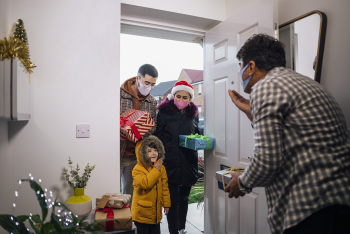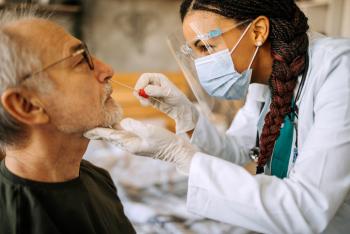Long COVID refers to a range of persistent symptoms that can linger for weeks, months or years after...
Read More

The coronavirus pandemic and the accompanying stay-at-home orders have greatly increased people’s reliance on grocery delivery services and other forms of online shopping. Rumors and misinformation circling around social media have introduced new questions and concerns about whether or not products entering their houses are safe, or if they might have remnants of the coronavirus living on them.
The Centers for Disease Control and Prevention (CDC) has continued to update its guidelines on how long the coronavirus can live on different surfaces, and the best ways to clean and disinfect new items before bringing them into your house.
“It’s important to clarify the difference between cleaning and disinfecting,” said Meredith Spena, manager of Infection Prevention and Control, Inspira Medical Center Mullica Hill. “Cleaning refers to the act of physically removing germs from surfaces to lower the risk of spreading infection. Disinfecting, on the other hand, refers to using different chemicals to kill various germs.”
In order to maximize the benefit of these processes, Spena explains, cleaning and disinfecting of household surfaces should be done on a frequent basis. But what about items you bring into your house, such as groceries?
To disinfect surfaces and other hard products coming into your house, a common household cleaner should suffice. Look for household cleaners that have an Environmental Protection Agency (EPA) registration number on them. The labels on the product will have instructions for how to use the product safely and effectively. You can also look up the number on the EPA website to determine its effectiveness on COVID-19 and other pathogens.
If and when you go out, social distancing, wearing a face mask and only touching items you intend to buy can be crucial steps in preventing the spread of coronavirus. Avoid touching your eyes, nose or mouth while shopping or after leaving the store until you have washed your hands with soap and water or used a hand sanitizer.
Spena also says that the most important thing to clean remains the same as it has since the virus was first introduced — your hands, ideally with soap and water which will physically remove germs from your hands. If soap and water is not available, a hand sanitizer with at least 60% alcohol may be used. Just make sure to cover all the surfaces of your hands and fingers and rub them together until dry.
“The absolute best thing that you can do for yourself and everyone else in your household is to wash your hands after touching anything that comes into the house,” said Spena. “The extra precautions of wiping down packaging and disposing of bags are rendered useless if your hands aren’t washed afterward. For items that cannot be cleaned or disinfected, like paper envelopes, wash your hands after touching the item and disinfect the surface on which it sat.”
Taking any extra cleaning and disinfecting steps, however, are not a substitute for practicing the nationally implemented social distancing measures that remain one of the most important measures to stopping the spread of the coronavirus.

Long COVID refers to a range of persistent symptoms that can linger for weeks, months or years after...
Read More
A Very COVID Christmas: How to Celebrate Safely
Read More
After more than two years of masks, social distancing and travel restrictions, this winter is likely...
Read More
The material set forth in this site in no way seeks to diagnose or treat illness or to serve as a substitute for professional medical care. Please speak with your health care provider if you have a health concern or if you are considering adopting any exercise program or dietary guidelines. For permission to reprint any portion of this website or to be removed from a notification list, please contact us at (856) 537-6772